Final report for SGA16-001
Project Information
The SARE Advisory Committee met in August 2015 and agreed that the Georgia SARE LOGIC model objectives needed revision. The last revisions were in 2007 so the group worked hard to update the SARE Logic Model. The updated objectives are compost, organic production, grazing-based animal production systems, direct marketing, conservation tillage systems, and local food systems. The Committee also decided upon trainings and conferences to support for the upcoming year that would fulfill these objectives. These include support for the following events: Compost Operation workshop, Organic Production Training Workshop, Modern Marketing Tools Training, and Southeast Research and Education Center Field Day. We awarded scholarships to county agents to attend the following conferences or workshops: Compost Operation Workshop, Georgia Organics Conference, American Forage and Grassland Council, Modern Marketing Tools Training, and Southern Sustainable Agriculture Working Group Scholarships. All of these activities increase knowledge and confidence in participating agriculture professionals which then translates to an increased ability to assist organic farmers, resource limited, and small farmers.
During 2006, the Georgia Model State Program developed a LOGIC Model to guide our training efforts. The LOGIC Model was then updated in 2015 to reflect the current needs of Georgia as directed by the SARE Advisory Committee. To reach our long-term goal of “Increased use of sustainable agriculture practices by producers at multiple scales supported by a knowledgeable network of agricultural professionals ensuring a high proportion of diverse, profitable, and environmentally-friendly farm operations”, we identified, in 2015, the following six areas for training workshops: compost, organic production, grazing-based animal production systems, direct marketing, conservation tillage, and local food systems.
Advisors
Education
The educational approach for SARE programs strives to use hands-on practical approaches to train trainers on sustainable agriculture. We focus on topics identified by our advisory committee through the logic model. We do this by hosting workshops, conferences, and classes about sustainable agriculture throughout the state of Georgia. We train county agents in sustainable agriculture through foundation training for new agents, conference scholarships, access to SARE books and material, and support in programming. We also provide a sustainable agriculture newsletter, listservs, Facebook pages and website to keep participants informed about sustainable agriculture.
Education & Outreach Initiatives
Composting systems is an activity defined by the SARE Advisory Committee and part of the Model State Program Logic Model. As part of this objective, we organized a compost operation workshop and field day in collaboration with several partners.
The workshop included general sessions on the science of composting, microbial effects, types of composting systems, feedstock sources and composting in the poultry industry. The participants also had several labs and a municipal composting operation visit. Julia Gaskin served on the Planning Committee and did a presentation on the microbial effects of composting. This workshop was a collaborative effort with UGA Extension, UGA Engineering Outreach Service, USDA Rural Development.
UGA-OnFarm-Compost-Workshop-2016-Flyer
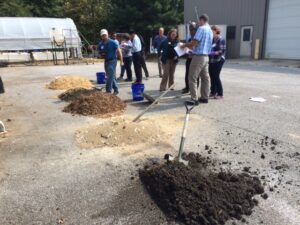
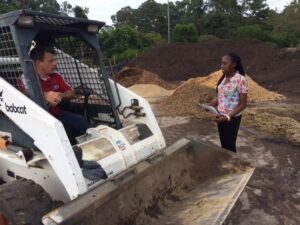
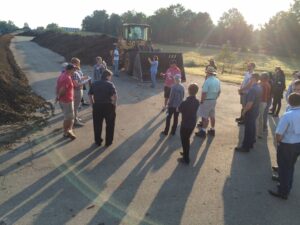
Photo of workshop attendees making compost piles and touring compost facilities during the workshop.
We had eight county agents attend this training on scholarship with SARE funds. Here are a few of their outcomes and impacts from the training:
Amanda Tedrow, Clarke County Extension agent had this to say about the program, "As the co-creator of the Georgia Master Composter program I was very excited about this workshop. The speakers were engaging and offered education on composting at different levels than our local program which often works with homeowners and backyard gardeners. This training gave me hands-on experience with different food stocks and the pros and cons of each. Being able to build our own pile as a team to see how the temperature would change was extremely interesting. I hope to incorporate this into our Master Composter program in future years."
Julie Airing, extension agent in Clayton County, used the information from the workshop to teach others in her community about composting, some examples include: vermicomposting workshop at Atlanta Science Festival, vermicomposting booth at FoodWell Alliance Soil Festival, vermicomposting workshops at Arnold Elementary Science Night, Composting clinics at Jonesboro Farmers Market, Compost bins at Flat Shoals Community Garden, FoodWell Alliance Local Food Grant.
Kelli Cody, Columbia County agent, stated that she used knowledge gained from the workshop during meetings with my Master Gardener Sprouts Day Camp we held this summer for students ages 6-8. "We did several activities on composting (what goes into compost, what can be composted, etc). I have also spoken with 2 homeowners on a site visit about starting a compost system in their gardens and one has started the process."
Organic production systems were identified by the SARE Advisory Committee as an area where more training was needed for extension and other agricultural professionals to provide technical assistance to growers. We leveraged SARE funds to support Dr. Ayanava's travel as well as printed materials for this workshop.
We created an in-service training for county agents on organic production. The workshop included a morning farm tour to a local successful organic farm. The farm visit included discussions by the farmer on crop rotations through the field and high tunnels. It included discussion with the farmer on crop rotation, crop selection, labor needs, economics of organic farming in a general sense and IPM. After the farm visit, the group met for discussion on good practices observed and areas of improvement. There was a presentation from Dr. Little about organic pest and disease options. Dr. Ayanava from Auburn Extension traveled to give a presentation on Organic IPM and new research in the field of trap crops and timing. Then the participants broke into small groups to discuss a case study and present their recommendations for the problems presented.
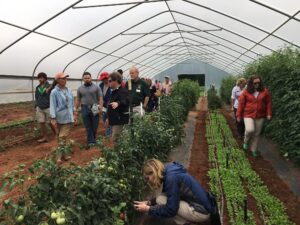
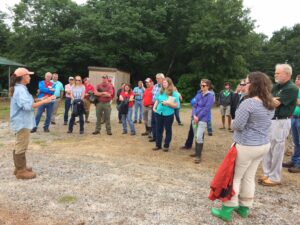
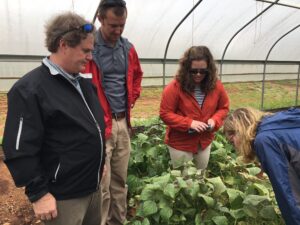
Photos from the farm tour of the Organic Production Training Workshop.
Thirty-two county agents attended this training and all completed surveys at the end of the workshop. The county agents were asked to rate the content of this training on a scale of 1-5, with 5 being "better than expected" and 1 being "not as good as I expected", the average response was 3.9. When asked how this workshop changed their knowledge, interest, and confidence in using these skills on a scale of 1-5 with 5 being "greatly improved" and 1="no change", the average responses was 3.6 for all three. When we asked how helpful was the meeting, 81% said they plan to make some major changes to their programming or that they might use a few things differently. The most highly rated part of the training was farm tour followed closely by the Organic IPM presentation by Dr. Ayanava.
Here are a few of the outcomes and impacts from the county agents. This training took place in May and we followed up with them in July. We will follow up in the future to get more concrete impacts.
Keith Fielder, Putnam County extension agent, said "We do have a few people in organic production and a few people interested in it. I plan to use this information from the ANR update in a future program directed at the people in organic production. As of right now, I have primarily used this information a couple of times to answer a client call or question and also use it on daily site visits."
Alicia Holloway, Barrow County extension agent, said "This program was very helpful! In organic production there is a lot of variability in production practices, markets, etc, so anytime I can see a successful organic farm, it gives me an example that I can use when talking to other sustainable producers of specific practices that farmers are using, anything from how other farmers deal with weeds to how they manage different parts of the business. This has given me some great tools when talking to home, school, and community gardeners, as well as homesteaders."
Steven Patrick, Habersham County extension agent, said "The workshop gave us a number of handouts and websites to refer clients to. Upon returning home I shared it with the Mountain Earth Farmers Network, Master Gardeners, on the radio and in the Northeast Georgian. I felt like the information was timely and useful. I’d definitely like to see more work in this area, since we get a lot of calls for this type of information. I hope to link a number of the handouts and websites to our local page, I just haven’t had a chance. We used the links in 4 extension newsletters sent to 100 clients each. I also used it 5-6 times on my WCON and WCHM Broadcast each week. The show airs weekly for about 30 minutes to approximately 15,000 folks. I also published an article in the Northeast Georgian which circulated to 10,000. On the site visits I met with around 35 farmers at 20-25 farms where I shared the information. We also sent out an email to the folks with the Mountain Farmers Network for them to share with their members."
Organic production systems were identified by the SARE Advisory Committee as an area where more training was needed to increase the capacity of extension and other agricultural professionals to provide technical assistance to growers. We provided scholarships for agents to attend the Georgia Organics Conference.
The Georgia Organics Conference is a premier conference for organic producers and small farms. The educational sessions focus on a wide range of our training objectives including, organic production, conservation tillage systems, grazing-based animal production systems, composting, direct marketing, and local foods systems. These sessions increase knowledge and confidence in participating agents, which then increases the likelihood of them working with beginning farmers, organic producers, and resource limited farmers. It features eight educational tracks that include 32 sessions for growers, livestock producers, farm to institution, and farm & food policy. The conference also includes farm tours to a diverse range of organic farms in the area.
We awarded scholarships to five county agents to attend this conference.
Josh Fuder, Cherokee County extension agent, said "The Georgia Organics conference is very important to me in my role as an extension agent. I feel this conference is one of the few places where I get a chance to interact and understand what the needs and priorities are for producers in the urban and local food production areas. I learn a great deal of new and innovative ways to grow both from the educational sessions but also from personal conversations with fellow attendees. The contacts and info benefits my knowledge base when I do get questions from individuals that are looking to get into more non-traditional ag production. The farm to school and school garden info also helps me as I am on our county farm to school committee and deliver a yearly training for educators in our county each year in May."
Emily Cabrera, Fulton County extension agent, said "This conference, like all the GA Organic Conferences, is always educational and provides updates on information previously learned, and sometimes re-confirms things I learned from previous conferences. I was most excited about the Organic insect pest management (IPM) as I have had a hard time finding new and credible information regarding this area, especially from Extension publications. This year, we heard about specific mesh materials that had been trialed for exclusion methods that were highly successful, depending on the mesh size. This was a fairly new concept that I can now talk about with producers in an intelligent way and refer them to a resource for further information. The other wonderful thing about these conferences are the people I meet and the networking that has always led me to get involved in other things that advance my educational, personal, and career pursuits."
James Morgan, Dougherty County Extension agent, said "I am currently working with one certified organ farmer and three naturally grown type farmers with organic chemical recommendations. I make organic fertilizer recommendations for homeowners’ gardens. Currently, I am about to do a program in August that will include conventional vs. organic farming."
Local food systems were identified by the SARE Advisory Committee as an area where more training was needed to increase the capacity of extension and other agricultural professionals to provide technical assistance to growers. We provided scholarships for county agents to Southern Sustainable Agriculture Working Group (SSAWG) with SARE funds.
The Southern SAWG holds the Practical Tools and Solutions for Sustaining Family Farms Conference, an annual January event that provides a forum to learn about sustainable farming techniques and marketing strategies, community food systems, and federal farm policies and programs that promote sustainable agriculture. This event also provides producers, researchers, information providers, concerned consumers and community organizers the opportunity to build networks, strengthen alliances, and celebrate the achievements of Southern sustainable farmers.
Three county agents received funding to attend the SSAWG Conference.
Charlotte Meeks, Houston County extension agent, stated that "I have used the information with answering about 10 clients questions who are interested in being more sustainable or going organic."
Melissa Mattee, Towns County extension agent, stated "I often incorporate sustainable cultural methods I learned at the conference into my weekly newspaper article. Also, we have several emerging organic farms and orchards. I have worked with one new organic farm run by a couple new to the area to survey for diseases and go over cultural control methods for powdery mildew, tomato spotted wilt virus and Septoria leaf spot. I am also working with an organic blueberry orchard on cultural and organic recommendations for rust control."
Programming and activities to promote grazing based animal production systems is an activity identified by the SARE Advisory Committee and part of the Model State Program Logic Model. As part of this objective, we provided a travel scholarships to the American Forage and Grassland Council Conference.
The American Forage and Grassland Council is the leader and voice of economically and environmentally sound forage focused agriculture. The annual conference brings together over 2500 of the best minds in forage industry producers, extension agents, educators and more. The educational sessions include Technology in Grasses, No till/Soil Health, Warm and Cool Season Grasses, Tall Fescue – Endophyte-Animal Relations as well as poster presentation and Forage ID Contest. The SARE Model State Program provided a scholarship to the county agent, who is an area beef cattle agent, to attend this conference.
Adam Speir, Madison County extension agent, stated "For the AFGC conference, that was a very beneficial conference for my programming. I used information from that workshop to start developing a “Fencing for Foragers” field day that was hosted in the county on April 20th where 27 people attended and learned about rotational grazing, temporary fencing techniques, and soil health benefits of grazing management. As a result of the training, 47% said that they plan to make some changes to their management systems on their farms."
Lucy Ray, Morgan County extension agent, stated that "I used information in routine client visits as well as on Cattlemen to Cattlemen segment on scouting pastures."
Programming and activities to promote direct marketing is an activity identified by the SARE Advisory Committee and part of the Model State Program Logic Model. As part of this objective, we helped sponsor a workshop on marketing for small businesses.
This workshop covered topics like integrating and sustaining a business plan for small businesses, marketing essentials and strategies, financial strategies for small businesses to keep up in the long term and how to keep your customers engaged through social media. Expert speakers were from the Georgia Department of Agriculture, The Center of Innovation for Agribusiness and the UGA Center for Agribusiness and Economic Development. The workshop was jointly sponsored by SARE, the Georgia Farmers Market Association, Georgia Innovation Agribusiness, Georgia Grown and Norcross Community Market.
We had 22 participants attend this workshop and 11 people completed surveys. Everyone who completed a survey said they plan to use the information in the workshop to help farmers/vendors. On a scale of 1-5, 5 being "better than expected" and 1 being "not as good as expected", participants gave an average response of 4.4. We asked participants how the workshop changed their knowledge, interest in topics, and confidence in training using the information. The average responses were 3.9, 4.5, and 3.9 respectively with 5 being "greatly improved" and 1 being "no change". The most highly rated sessions were financial planning and digital marketing.
One county agent received a scholarship to attend the workshop.
Josh Fuder stated "I left this training with a great appreciation and understanding of the value of digital marketing and relationship management through social media for small producers."
Programming and activities to promote conservation tillage systems is an activity identified by the SARE Advisory Committee and part of the Model State Program Logic Model. As part of this objective, we organized a field day, the Southeast Research and Education Center Field Day "Getting the Most from Cover Crops".
The "Getting the Most from Cover Crops" field day included demonstrations on cover crop varieties and mixtures that can help farmers achieve their goals for erosion control, weed control, nitrogen, and more. The attendees learned how to maximize biomass to maximize cover crop benefits through morning presentation sessions. The afternoon field day had demonstrations of various cover crop species and how planting date affected biomass and nitrogen and four local farmers brought their no-till planters and demonstrated different ways to get their cash crop planted in the cover crops.
SARE books were distributed to agents and at events to the general public to help educate about sustainable agriculture.
SARE books, such as "Managing Cover Crops Profitably", "Building a Sustainable Business", "Building Soils for Better Crops", "Organic Transition", "Crop Rotation on Organic Farms", "Managing Insects on Your Farm", and "Managing Alternative Pollinators".
From May 2016-May 2017, 30 SARE books have been given to new agents around the state. The most popular book requested by agents was "Managing Insects on Your Farm".
SARE publications were distributed to agents and at events to the general public to help educate about sustainable agriculture.
The SARE publications are used to distribute information for farmers, gardeners, or general public about sustainable agriculture.
At the Georgia Organics conference, we had a booth and distributed 244 SARE publications to conference attendees.
Educational & Outreach Activities
2) Sustainable Agriculture at UGA Facebook page- The Facebook page is used to distribute news, event/workshop annoucements, resources, and other information for farmers, gardeners, or general public about sustainable agriculture. Between May 2016 and May 2017 we have increased our Facebook page "likes" from 318 to 413. We made 172 posts and this has resulted in a reach of 15,736 unique users or an average of 91 people per post with the most popular post engaging 580 people. Our posts were also "shared", "liked", "commented" on or "clicked on" more than 700 times.
3) Sustainable Agriculture at UGA Website (SustainAgGA.org)- The website is used to distribute news, event/workshop annoucements, resources, and other information for farmers, gardeners, extension personnel, or the general public about sustainable agriculture. Between May 1, 2016 and May 31, 2017 the SustainAgGA.org website has received 11,048 unique visits.
4) Sustainable Agriculture at UGA Newsletter- The Sustainable Agriculture Newsletter is our quarterly newsletter that has information for farmers, gardeners, extension personnel, and others interested in sustainable agriculture in Georgia. Please see attached newsletters. This goes out to the 896 people on the listserv.
5) UGA Sustainable Food Systems seminars--Seven seminars were scheduled from August 2016-May 2017. The program assistant helped to coordinate these events.
"Regenerative Agriculture Using Pasture-Based Livestock Systems"--8/29/2016, Conner Hall, UGA, 26 attendees
"Sustaining Georgia's Seafood Industry-Past, Present, Future"--9/26/2016, Conner Hall, UGA, 27 attendees
"A Multidimensional Analysis of Global Food Security"--10/31/2016, Conner Hall, UGA, 24 attendees
"Why Genetically Modified Crops May Not Solve World Hunger-Lessons from Argentina"--11/14/2016, Conner Hall, UGA, 24 attendees
"Extreme Events: Climate Change and the Energy Food Water Nexus"--1/23/2017, Conner Hall, UGA, 11 attendees
"Growing More with Less: Tiny House Utilization in the Farming Industry"--2/20/2017, Conner Hall, UGA, 16 attendees
"Perennially: Potential and Challenges for Future Sustainable Crop Production"--3/20/2017, Conner Hall, UGA, 12 attendees
6) Georgia Fruit and Vegetable Growers Association Meeting-Julia Gaskin organized the organic track of speakers at this conference.
7) 16th Annual Conservation Production Systems Training School-Julia Gaskin served on the Planning Committee and did a presentation. The workshop included general sessions on soil health and benefits of conservation production systems by NRCS Regional soil scientist and also had a farmer panel on experiences of using conservation production practices. The breakout sessions covered conservation production system basics, soil biota, cover crop mixes, using cover crops to supply Nitrogen, developing cropping systems to address climate variability and the economics of conservation production systems. These breakout sessions had speakers including farmers, UGA Extension Agents and NRCS field personnel as well as researchers working in the topic areas.
Participation Summary:
Learning Outcomes
Project Outcomes
Face of SARE
The Georgia SARE Model State Program increased participation in sustainable agriculture programming in 2016 as evidenced by the increase in attendance at events, the increase in collaborative events, and more name recognition for SARE. We continued conducting stand-alone workshops to address specific areas of our Logic Model that included supporting a Modern Marketing Tools training for county extension agents and market managers. Other Model State efforts include collaborative events like organizing the organic conference at Georgia Fruit and Vegetable Growers' annual conference, providing scholarships for several sustainable agriculture related conferences, and continued populating/updating of the sustainable agriculture website and Facebook page. Additionally, we publish a quarterly newsletter and send periodic updates to our Sustainable Agriculture listerv. We have displayed information on SARE at several events and at applicable trainings and workshops around the state such as the Georgia Organics Conference. By organizing and displaying at a variety of different events, we are able to reach a wider and more diverse audience.